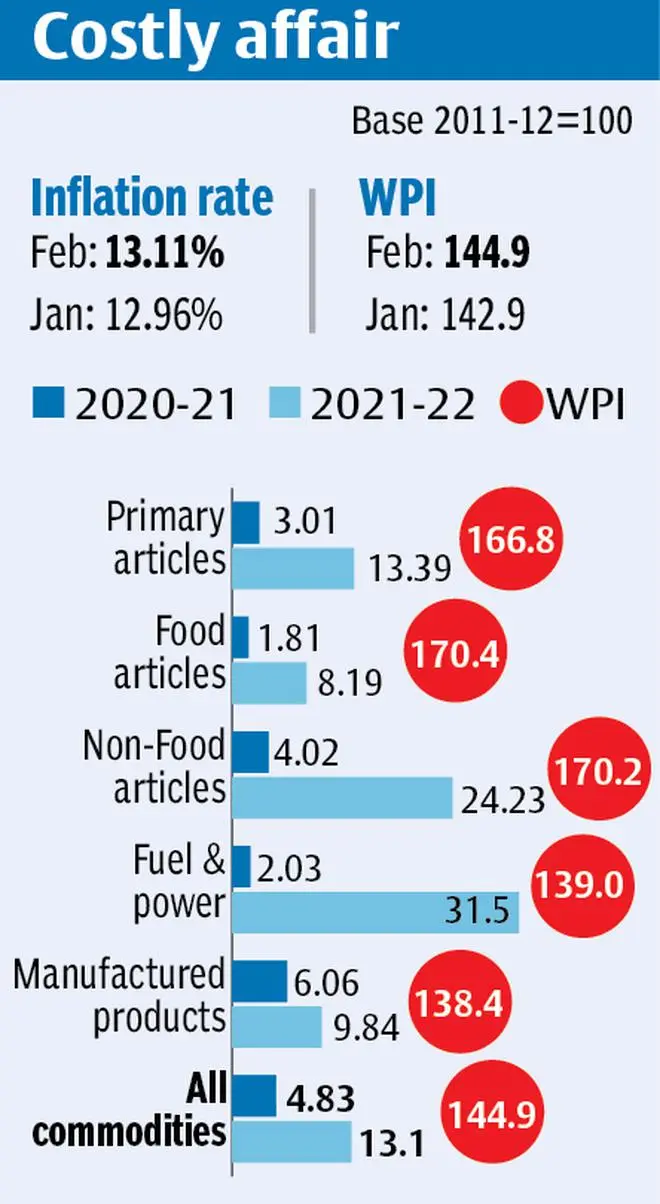
Both the numbers are yet to factor in the higher crude prices as retail prices of petrol and diesel have not been revised since November 4, 2021 | Photo Credit: RAMAKRISHNA G
New Delhi, March 14 Pricier mineral oils, basic metals, chemicals and chemical products, crude petroleum and natural gas sent the wholesale inflation surging to over 13 per cent in February. Simultaneously, retail inflation hit an eight-month high of 6.07 per cent during the month

This is the second successive month when retail inflation based on the Consumer Price Index (CPI) is over 6 per cent while this is eleventh consecutive month when producer inflation based on the Wholesale Price Index (WPI) has come in double digits. Both the numbers are yet to factor in the higher crude prices as retail prices of petrol and diesel have not been revised since November 4, 2021.
The Finance Ministry told the Lok Sabha on Monday that in order to “safeguard the interests of the common man”, retail prices of diesel and petrol have not been revised since November 2021 despite the increase in global crude oil prices. In response to another question, the Oil Ministry said the country is monitoring global energy markets as well as potential energy supply disruptions in the evolving geo-political situation.
Although prices of vegetable, fruits, eggs, etc., recorded a moderation, costly clothing and footwear along with food and beverages have pushed the inflation rate to 6.07 per cent in February as against 6.01 per cent in January. This is above the RBI’s upper limit of targeted inflation range of 2 to 6 per cent.
Food and beverage inflation rose to a 15-month high in February despite a sequential moderation in food prices driven by eggs, vegetables, pulses and sugar. While adequate water reservoir levels and a rise in the production of several Rabi crops is an encouraging sign, the rising prices of edible oils continue to pose a challenge.
Swati Arora, Economist with HDFC Bank, said the rise in fuel prices is likely to have both, a direct and an indirect impact (via higher transportation costs) on inflation readings. “We expect inflation to average in the range of 6-6.2 per cent in H1 (April-September) FY23 and ease to 5-5.5 per cent by H2 (October-March), pulled down by a base effect and expectations of some moderation in crude oil prices. For full FY23, we expect CPI inflation to average 5.5-5.7 per cent. From the policy perspective, we expect the RBI to announce a rate hike only in H2 2022,” she said.
The Commerce and Industry Ministry attributed the over 13 per cent wholesale inflation (as against 12.96 per cent in January) to rise in prices of mineral oils, basic metals, chemicals and chemical products, crude petroleum & natural gas, food articles and non-food articles etc.
Aditi Nayar, Chief Economist with ICRA, said the transmission of higher commodity prices to WPI inflation will be relatively rapid. However, in an uncertain demand scenario, output prices that reflect in the CPI basket may adjust relatively slowly. “An eventual cut in excise duty could absorb a portion of the impact of higher crude on the retail selling prices of petrol and diesel and therefore on the CPI inflation. Nevertheless, higher edible oil prices will exert pressure on the food inflation in March,” she said.
Sunil Kumar Sinha, Principal Economist with India Ratings & Research (Ind-Ra), said as a flare up in crude oil prices is expected to keep the energy prices soaring, logistics and transportation costs are likely to remain high in the foreseeable future. Ind-Ra expects the wholesale inflation to remain in double-digits in the near term, he added.
Published on March 14, 2022

Comments
Comments have to be in English, and in full sentences. They cannot be abusive or personal. Please abide by our community guidelines for posting your comments.
We have migrated to a new commenting platform. If you are already a registered user of TheHindu Businessline and logged in, you may continue to engage with our articles. If you do not have an account please register and login to post comments. Users can access their older comments by logging into their accounts on Vuukle.